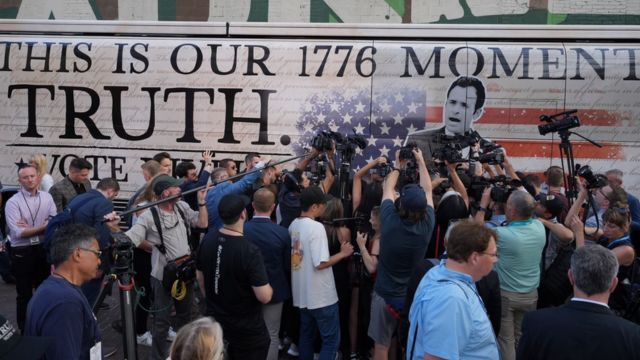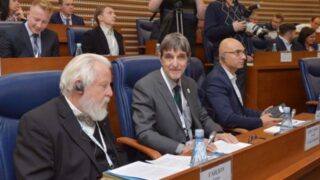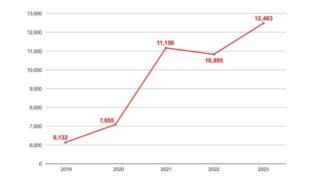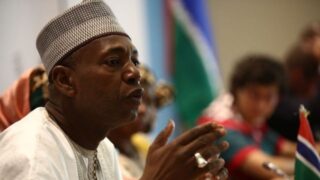What if a politician advocating for a Christianity-shaped worldview is not a Christian?
by Marco Respinti


Comics aficionados know it. “What If?…” is a cycle created by Marvel Comics to stress-test possibilities and limits of the so-called “Marvel Universe.” It is a complex of characters, continuities, stories, and parallel worlds that has its God-like creators, its para-religious beliefs, and its moral codes. Started in 1977, it includes series and “one-shots,” investigating and probing how things could have been going, supposing some key moments in the adventures of Marvel super-heroes and villains had evolved differently.
Comics are a prominent aspect of pop culture and may have something relevant to say even to the scholars of creeds and beliefs. The “What If?…” experiment looks like an exercise in “alternative fictional reality.” To some extent, it corresponds to “uchronia,” or alternate history. This is a literary genre through which writers, but also historians, re-imagine facts and moments, as if in a laboratory or a role-playing game, to better analyze and comprehend them. It is the equivalent in terms of time, to what the concept of utopia, another literary genre, is in terms of space. Being both neologisms deriving from Greek, “uchronia” and “utopia” are built on the particle “ou,” “οὐ,” conveying negation, and per se mean “no time” and “no space.” My humble proposal would be to respectively redefine them in literature as “elsewhen” and “elsewhere” to deplete and thwart the nihilistic element that the diphthong “ou” transmits.


Now, “what if “the next president of the United States is a Hindu? This is not Marvel Comics, but an exercise in possible futurology that may serve some purpose. American Hindu Vivek Ramaswamy is in fact running for the White House. Marco Tangheroni (1946–2004), a leading Italian historian of the Middle Ages who specialized in the history of Mediterranean navigation and trade, used to say that yes, we do make and study history also using “ifs” and “buts.”
On November 5, 2024, Americans will elect their 47th President, his or her deputy, as well as the House of Representatives and one third of the Senate. Among the contenders for the White House there is Ramaswamy, who runs as a Republican and will first go through primary elections state by state. Born in Cincinnati, Ohio, in 1985, his parents immigrated from the town of Vadakkencherry in Palakkad district, Kerala state, India. He earned a B.A. summa cum laude in Biology at Harvard University and a J.D. at Yale Law School. An entrepreneur and a journalist, he is a fairly good pianist and even achieved some national fame as a tennis player.
While criticized for some controversial comments, we can say that in general as a presidential candidate, Mr. Ramaswamy appears to champion traditional views hold dear by American conservatives. American Conservatism is an inextricable blend of different streams and currents of thought. Conservatives of different persuasions agree between themselves on at least sixty percent of topics. This writer has been studying, and dissecting, American Conservatism at least from 1992. I worked as a taxonomist of that movement, to conclude that its reductio ad unum is impossible (and probably not desirable either), but also that describing it as a mere juxtaposed patchwork is wrong. One unifying element are Christian values. This does not mean that American Conservatism is a Christian movement per se, nor that all American Conservatives are Christian or that all American Christians are conservative. It means that Christianity played at least a molding role in shaping American Conservatism’s vision and rhetoric, be its proponents active Christians or not. In either case, American Conservatism fades when it loses its Christian dimension.
What then if a proponent of American Conservatism, stating that he is ready to carry it even to the White House, is not a Christian? Without assessing Ramaswamy’s chances as a presidential candidate, I propose a logical sequence of considerations. It would be clear to readers that my purpose here is not to endorse or study Ramaswamy’s political views but to ask the general question whether a Hindu can be a credible representative of American Conservatism.


1. If American Conservatism is not a Christian movement, but depends on Christianity, anyone who wants to appeal to conservatives in America needs to uphold Christian values. Here the focus is not on the ever-possible hypocrite, but on the relevance that Christianity has for American conservatives.
2. American Conservatism is not a confessional phenomenon, let alone a theological proposition. For sure is not a civil religion, a concept popularized and studied by American sociologist Robert N. Bellah (1927–2013) and much re-debated in the 1990s with the appearance of the movement known as “Neo-Communitarianism.” It cannot be reduced to what is only one of its components: the so-called “Christian Right,” or “Religious Right.” This was mainly (but not only) an Evangelical phenomenon that was relevant during the 1980s and 1990s and knew new incarnations in subsequent decades. American Conservatism is the manifestation, cultural and political, of a culture that walked a different path compared to increasingly secularized Europe. America is indeed a different “West.” American Conservatism claims in fact to be the vindication and continuity of the original intent of the nation, as enshrined in its founding documents, passing on the sense of a Christian commonwealth. Not of the United States as a confessional state but as a nation “naturaliter Christiana,” naturally Christian.
3. American Conservatism is not the persuasion of the majority of Americans, but the claims of American Conservatives may still be shared by more than half of the U.S. citizens. This is particularly true for the understanding by the majority of Americans of their national historical experience, as well as for the principles and values that they consider fundamental for keeping their republic.
4. In fact most Americans, consciously or unconsciously, share a Christian worldview, that they are conservative or not. Of course, there is much debate today on what the expression “Christian values” means. In traditional Christianity, morals derive from theology, so that a theological consensus should directly produce a moral consensus. However, today things are less straight. A typical case is President Joe Biden. He is a well-known practicing Roman Catholic, yet his public views on some fundamental issues contradict the official teachings of the Catholic Church. Does this mean that most Americans no longer share an implicitly Christian worldview? My answer is no. An old school of political science distinguished between the “real country” (i.e., its flesh-and-blood citizens, or the majority of them) and the “legal country” (its ruling elites whose views also dominate the media). Similarly, there is a distinction between “creative minorities,” relevant and influential as they may be, and the majority of the citizens; between some vocal but minority fringes and what the beginning of the U.S. Constitution call “We, the people.” The basic negation of American morals deriving from a Christian worldview that fuels some radical factions of the American Left and has its most recent incarnations in “cancel culture” and what some call “wokism,” determines only part of the votes traditionally obtained by the Democratic Party. While several Democratic leaders and personnel seem to be proponents of a post-Christian culture, many of their actual or potential voters are not. U.S. national parties remain chiefly defined by regional and sectional cultural loyalties, and this means that values and principles may vary much within the same party. So, if one would roughly sum Christians who vote for the Democratic Party to the bulk of the Republican voters, whose majority would define itself as Christian, it would be confirmed that most Americans share (at least implicitly) a Christians worldview.


5. This “Mr. Smith on Main Street sociology” is strengthened also by the consideration that several voters who grew disillusioned by radicalism and exaggerations stopped identifying themselves with the Democratic Party. Books like “Can a Catholic Be a Democrat?” by David Carlin and “This Is Not Your Father’s Democratic Party” by William Sylvester Noonan are just tips of an iceberg. Often this datum does not enter statistics, because only a minority of these lapsed Democrats turn to the Republicans. Others just renounce voting. But they do not renounce their Christianity-shaped American worldview.
6. An attender of the Hindu Temple in Dayton, Ohio, and the Cincinnati’s St. Xavier High School, a Jesuit institution, at a young age, as well as a disciple of a piano teacher who was a Conservative Christian, Ramaswamy enters the scene here as a non-Christian proponent of a Christianity-shaped American Conservatism. His basic principles and values intrinsically coincide with the worldview of the majority of Americans, of different political persuasions. This prompts a first conclusion.
7. Ramaswamy’s candidacy seems to suggest that Christian principles and values are not… Christian. One could say that they naturally fit human nature, in a rather interesting variation of the “anthropic principle” applied to morals. Others may add that this shows the divine ordination of the universe. Some may even conclude that the divine ordination of the world is “naturaliter Christiana,” naturally Christian. As to Ramaswamy, his political program is a decalogue whose entry no. 1 says, “God is real.” It is a Christian as well as a Hindu statement, since Sanātana Dharma (the real name of the complex of beliefs that Westerners indicate with the exonym “Hinduism”) is a monotheistic religion, as one could infer from the “Ṛg Veda” (1, 164, 46): “To what is One, sages give many a title.” This is enough for Americans shaped by a Christian worldview. Entry no. 10 of Ramaswamy’s decalogue claims: “The US Constitution is the strongest guarantor of freedoms in history.” Some non-Americans may disagree, but for sure the principle of religious liberty, which is the first political right of every American citizen, as sanctioned by the US Constitution, may allow a Hindu candidate for the White House to be voted by Christians, and perhaps even by the majority of Americans.









